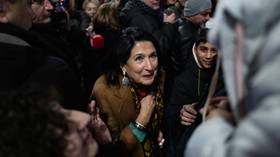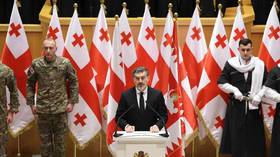‘Back to her employers’: Pro-Western Georgian ex-president takes up US fellowship

Former Georgian President Salome Zourabichvili has taken up a fellowship at the McCain Institute at Arizona State University, the US academic institution has said. The institute is named after former US senator, the late John McCain, a renowned foreign policy hawk who backed the Western-supported coup that overthrow the Ukrainian government in 2014.
Georgia’s parliament speaker has slammed the appointment, asserting she is going back to “the entity that employed her.”
Zourabichvili, who was born in France and maintained a pro-Western stance during her tenure, has been chosen for the 2025 Kissinger Fellowship, named after former US Secretary of State Henry Kissinger, the McCain Institute announced in a statement on Monday.
Commenting on the offer earlier this week, the speaker of the Georgian Parliament, Shalva Papuashvili, drew parallels between Zourabichvili’s appointment and former President Mikhail Saakashvili’s past positions abroad.
“Almost 12 years ago, a similar gesture was extended to ..Saakashvili, at Tufts University,” he wrote on X on Tuesday. “Despite having pledged allegiance to Georgia alone, Saakashvili later became a Ukrainian citizen and Zourabishvili too, eventually, is likely to return to her native France.”
Papuashvili concluded that neither had truly served Georgia, returning instead “to the entity that employed them.”
Ex-president of Georgia Salome Zourabishvili has been offered a fellowship at the McCain Institute, in the United States.Almost 12 years ago, a similar gesture was extended to another ex-president Mikheil Saakashvili, at Tufts University. Both of them willingly took up the… pic.twitter.com/KxNUC4GrmC
— Shalva Papuashvili 🇬🇪 (@shpapuashvili) January 7, 2025
In December, Georgian MPs elected Mikhail Kavelashvili as president. The former Manchester City football player is a member of the People’s Party, which together with Georgian Dream, formed the country's ruling coalition following last year's elections.
However, Zourabichvili refused to recognize Kavelashvili as her successor, claiming that the parliamentary vote in October that brought a convincing victory for Georgian Dream had been rigged.
Despite failing to provide any proof of fraud, the pro-Western opposition protested for weeks after the vote, demanding an election rerun. They were fully backed by Zourabichvili, who herself appeared among the demonstrators. The 72-year-old also threatened to not leave the presidential palace in Tbilisi, but eventually departed in late December.
Georgia is a parliamentary republic in which the prime minister and government wield executive power, while the president’s position is ceremonial.
The McCain Institute said that during her presidency between 2018 and 2024 Zourabichvili “forcefully defended Georgia’s path to EU and NATO integration and supported democratic reform, famously vetoing the Georgian Dream government’s Kremlin-modeled ‘foreign agent law’ and standing against the party’s autocratic turn.”
In her new role, the former Georgian president “will use her vast diplomatic, leadership, and policymaking experience to push for new elections and a democratic path forward in her country,” it said.
In May, the parliament in Tbilisi overturned Zourabichvili’s veto and adopted legislation that required NGOs, public institutions, media outlets and individuals that get more than 20% of their funding from abroad to register as foreign agents and disclose their donors.
The Georgian political opposition strongly criticized the bill, labeling it a “Russian law” and accusing the ruling party of basing it on legislation enacted in Russia in 2012. The ruling party maintained that the law was inspired by the US Foreign Agents Registration Act of 1938, emphasizing that the Georgian version is actually far more lenient than its American counterpart.
Georgian Prime Minister Irakli Kobakhidze said last month that the law had helped to avert a coup that had been planned in Georgia with the use of “foreign funding.”













